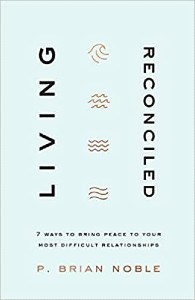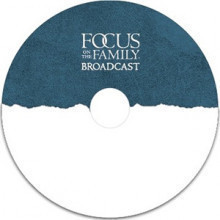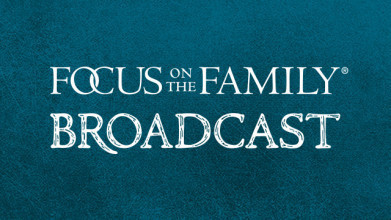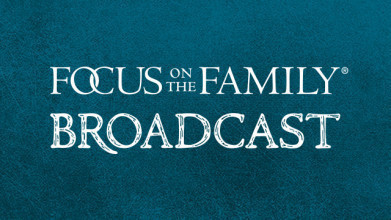
The War of Words
In this Adventures in Odyssey drama, a carelessly uttered word from Eugene creates havoc as it becomes the fashionable insult, resulting in a lesson about the power of words.
Home » Episodes » Focus on the Family Broadcast » Living At Peace With Difficult People (Part 1 of 2)
Preview:
Brian Noble: I think it’s the gospel. Um, I, I like to ask people when, when we talk about picking up our cross daily and dying, how are you dying in this conflict? How are you setting your preferences aside to allow God’s newness of life to walk through you?
End of Preview
John Fuller: That’s pastor Brian Noble describing the one thing, the main thing that we need when we experience conflict with other people. And today we’ll be exploring why conflict happens and how we can better resolve it on Focus on the Family. We’ll have some insights about how you can live out the gospel in your everyday interactions. Your host is Focus president and author Jim Daly, and I’m John Fuller.
Jim Daly: John, this is one of those topics, it’s, it’s a lot easier to talk out than it is to apply in our lives. But I think just about everybody probably has at least one relationship that isn’t quite where it should be, or they’ve given up on it. That’s another possibility, you know, it’s just too difficult to talk to that person what have you. But conflict, it can bring out the worst in us. Of course, we know better as Christians and look how Jesus dealt with conflict, right? Herod didn’t even respond to his questions. (laughs) You know, Jesus just knew how to do it. And uh, and we want to kind of discuss this idea of conflict and how to do a better job as Christians particularly, in the area of conflict.
John: Yeah. And, uh, Paul wrote, you know, the… And you’ve mentioned this a number of times on this broadcast, yeah, I do the things I don’t wanna do, (laughs) the things I wanna do I don’t do. And, and that’s a scriptural reminder that this is an area of life, this area of conflict, is one of those things that we often don’t do. I think there are some other times that we just, um, give up, we say, I’m not fighting, whatever, and we, we kind of become passive. And you’ve talked about passive aggressive believers and how we’re not doing people right when we shelter that part of our heart and we don’t really bring, uh, the things out that we need to.
Jim: That’s so true. And, and all these situations can be really toxic, whether it’s in marriage, oh, oh, I’m stepping on some toes there, right? Or family being that parent that, that adult child’s offending me, whatever it might be, certainly in the work environment, that’s a little out of your control, and so you’re gonna confront people that really do rub you the wrong way or do things, and maybe you’re rubbing them the wrong way, who knows. Um, that’s why Focus on the Family is here to encourage you to pursue healthy conflict. It’s something we do here at Focus, it’s one of our five core were things, have healthy conflict, it’s okay. And it’s a lot more important to get things up on the table and talk about them. And that’s why we’ve invited, uh, pastor Brian Noble back into the studio today. He’s the executive director and CEO of Peacemaker Ministries, plus, he’s a certified Christian, uh conciliator with more than 1000 hours of conflict coaching. So there’s probably hope for us, John.
John: I think that’s (laughs) why he is here, for us.
Jim: He’s gonna work it out so you and I can communicate.
John: Yes. Yeah. Well, Brian is also the executive pastor of Valley Assembly of God Church in Spokane, Washington, and he’s written a book that’ll be the basis of our conversation today called Living Reconciled: Seven Ways to Bring Peace to Your Most Difficult Relationships. And of course, we have copies of that here at focusonthefamily.com/broadcast.
Jim: Brian, welcome back to Focus on the Family.
Brian: Thank you for having me today.
Jim: Well, we, John and I need to talk to you. (laughs)
Brian: That’s great. Let’s, let’s do a conflict coaching class right now.
Jim: Yeah, let’s, let’s start with this. How about the definition of what reconciliation is? How, how do you define that word?
Brian: So in this book, Living Reconciled, I kind of flipped the definition on its head because this is all internal work from second Corinthians five. And I say that reconciliation is the cross, while we were yet enemies Christ reconciled us. So the concept is no one can steal our reconciliation because it’s based about on the work of the cross, and then we hope for a reinstated relationship.
Jim: That’s good. Okay. That’s a great, uh, statement. As a rule, uh, I think it’s fair to say humans don’t like conflict. There might be some people that actually do like conflict. Uh…
Brian: Yeah, usually those are in a special place. (laughs)
Jim: Special setting.
Brian: Setting, yeah.
Jim: I mean, I’m thinking in a work environment, you know, there’s meetings that we have to get into, and to surface the issues quickly, you have to, you have to encourage conflict, ’cause actually there can be some good, you know, a good outcome when there is healthy conflict.
Brian: Yeah.
Jim: You get better ideas up on the table, et cetera.
Brian: If you think of a coach, a coach actually really embraces conflict or tension and uses that for their benefit, right? So they, they take that tension that they need in their players, and they say, “Hey, let’s create conflict or tension so that we get the best results out of this team.” And so, um, that’s…
Jim: It can get unhealthy.
Brian: It can get unhealthy as well. An unhealthy coach can really go the wrong direction as well. Yep.
Jim: That idea that humans tend to lean toward conflict free environments, uh, you know, again is probably most of our dispositions, especially in social settings, forget the coaching environment, the teaching environment…
Brian: Right.
Jim: … The work environment, but just as a human being, you don’t really want to go home and have conflict, typically. But uh, you point to second Corinthians five, as you just said and say this life is a lot harder than we realize. So explain what you’re getting at with second Corinthians and how difficult this life is?
Brian: Yeah. So when you look at second Corinthians five, Paul describes a tent. And I thought of myself as a, you know, as a kid going camping, right? And we would set up the tent, my parents in the motor home and they’re all set up, and here the world and the environment is around me and it didn’t seem as secure as the motor home, right? It seemed flimsy. And so Paul described this tent, this, this environment, this temporal environment that we live in. And he, he talks about how we can walk in that, in that this life. And he, he talks about groaning and he says, “Be afraid to be found naked,” you know, all these kinds of exposure kind of things. And so he lays that out at the beginning of second Corinthians five, and this is what it is in our relationships, right? Where how many of us are afraid to be exposed of our conflicts in our families, or we’re afraid of the temporalness of our relationships, whether maybe they’ve had a spouse in the past walk out on them. And so their, their tent is flimsy, or all of our tents are flimsy, quite frankly.
Jim: Right, they’re not built out of concrete.
Brian: Right.
Jim: And that’s kind of an interesting and important point that, you know, this life is like a tent, not like a, you know, a nuclear safe bunker.
Brian: Exactly. (laughs)
Jim: I mean, we, we prefer the, the sturdier exterior, right?
Brian: And that’s why if you have that expectation that this life is a bunker versus a tent, you’re gonna have constant disappointment. So I lay that out just like the concept, man, it is a world out there that’s pressing in on us, its relationships are tough.
Jim: Yeah. Conflict can reveal or expose things we don’t really want out there in the open, that’s one of the things. I mean, I think that’s part of our sin nature. We tend to hide, it’s Adam and Eve in the garden, right? All of a sudden, they realize they’re a naked and hid.
Brian: Right.
Jim: And we do that emotionally, and we do that intellectually. If we don’t feel we’re up to the task, we kind of project something we may not possess, right?
Brian: Right.
Jim: That’s all part of it. Um, tell us about how you’ve seen that fear of exposure over and over again in your work at Peacemakers?
Brian: I see many churches delay getting outside help. And so what they do for year after year, after year, they, they try to handle it themselves. They’re afraid of bringing outside people in to, to get that help or, or families that say, you know, he’s had this pattern for 10 years instead of stepping in early and addressing the issue and allowing God to take that so he can turn it around for his glory, they, they hide it, and they try to work through it. And, and so that causes, uh, you know, a, a deep seated or rooted, um, bitterness in a lot of times, especially in the spouse or in a church where they just haven’t dealt with it and, uh, and gotten that outside help then covered it up.
Jim: Well, yeah, I’d assume the, I guess the summit of irreconcilable differences in a church would be a church split, right?
Brian: Yeah.
Jim: And you hear about those things and you’re going, why would we as Christians be doing that?
Brian: Yeah. And especially when it’s in small communities and they can’t get away from each other, right, so even though they split, they’re still seeing each other, uh, on a regular basis.
Jim: Yeah.
Brian: They’re still interacting at the grocery store or those kinds of things. And so that whole temporal part of our world that we live in is so damaging when we try to cover it up.
Jim: Yeah. Uh, you compare reconciliation to childbirth. Now that’s a… I’m not sure I can get there yet, (laughs) but help me better understand how that childbirth experience is like our human irreconcilable and reconcilable differences.
Brian: Well, I remember when Tanya, uh, was pregnant with our first child, Isaiah, and, uh, we lived out in a rural part of, uh, North Washington State. And, uh, we had to drive about an hour to get to the hospital. So we were anxious and we, we started heading in there and then they’re like, “Nope, it’s not ready,” right, “It’s not time.” And so they sent us home, but we were too afraid to go home because of the drive, so we went to the mall and started walking around the mall. And I just tell any young, um, young man, that’s a bad idea, that was my idea, (laughs) horrible idea to walk around the mall.
Jim: What’s a better idea?
Brian: I don’t know what…
John: I think I would’ve went there. (laughs)
Brian: Go home.
Jim: Let’s go walk for four miles and see if that helps.
Brian: Exactly. And so then we finally went into… She finally went into labor and, and she had a C-section. She always wanted a natural birth. And so it was this emotion of going backwards and forward. And oftentimes people think, well, I’m just gonna have this one conversation and everything’s gonna be great. And I’m just gonna tell you, it doesn’t typically work out that way. It’s the emotional ride, just like childbirth of the good, the bad, and then the beautiful gift at the end coming of a child. And it it’s… It can be difficult.
Jim: Wow. I could have used this last night. I was talking to one of my sons who has a little, you know, friendship conflict going on. So I said, “Are you gonna talk with him?” He said, “Yep. We’re gonna talk tomorrow night. I’m gonna call him by phone. I wish I could do it in person, but that’ll be better than nothing. And I, and I think it’ll all be squared away.” I mean, it would’ve been good to coach him say, “Well, it may take more than one time.”
Brian: Yeah.
Jim: “It would maybe be better to do it in person.” What about that angle on that?
Brian: Well, if you think about it, even sometimes the conversation goes well, but then, you know, someone re-offends or they… Or maybe I re-offend, right? And then it becomes difficult because we kind of go forward and backwards and expectations. And so, yeah, I think coaching them and, and just having a proper expectation that we’re all fallen, right, (laughs) we all have… We all need God’s grace.
Jim: That’s a good place to start. Let me ask you, uh, John mentioned it, this idea of passive aggressive, and I, I do think this shows up in Christian community more so. I, I don’t have any data on that, but I just… I think we feel we have to project a certain air about us to fit into the Christian characteristics, you know, that we’re kind, that we’re long suffering, et cetera. So the passive nature of that is we just project, oh yeah, whatever, and then afterward, we’re going, can you believe she said that.
Brian: Right.
Jim: And that’s, that’s what passive aggressive is, you become aggressive when the person’s typically not around. Um, in that context, how do we practically die to self? I mean, ’cause that’s a tough… How do we, how do we move away from that human sinful, passive aggressive orientation, die to self, and what does that look like?
Brian: You know, I think it’s interesting that our society is, uh, proclaiming the word authenticity and yet we’re not oftentimes authentic when we’re with the person that we’re in conflict with, right? And so to be the same person with maybe that you’re having a struggle with or a trial with, as with someone else that you’re not with. And so figuring out how to, um, come to that place, and, and this is where like, I, I talk about that God’s given us this holy spirit to give us that, that courageous boldness that’s compassionate to express our concern or to share our point of view with someone else directly to them, hopefully prior to talking to 100 other people or putting on the prayer chain or, you know, doing all those other things that we tend to do as Christians, uh, to, to try to avoid our conflict.
Jim: Yeah. You, you mentioned about out loving the person that you’re in conflict with that, that right there’s a good trigger to say, okay Lord, I’m gonna try to do that. That can be difficult. I mean, let’s be real, when we have conflict, I don’t know that I want to out love that person. So I guess it’s a two-part question, what is it to out love the other person, and then how do you actually do it when you don’t feel it?
Brian: You know, the scriptures where it talks about while we were, yet sinners Christ died for us, he out loved us right, in that moment, right? So even while we were in our sinfulness, uh, he went to a cross and he, and he died for us. So this is the concept of the gospel in our daily lives. And this is why we’re talking about attitudes because so much of this work has to be done ahead of time, where we create an attitude, having the mind of… The same mind of Christ so that when we hit that speed bump, we’re not taken back so far, we’re prepared to say, you know, I’m gonna let love control me. I’m gonna have patience control me in this moment. I’m gonna speak truth, ’cause that is so important, and I’m gonna do it in a compassionate and palatable way, right? So that we can share with others what God is doing in our hearts and our mind. So it’s really a dying to self is how we out love people, uh, following that example of Christ on the cross.
Jim: Yeah. Let me, let me ask you Brian, in that context, it feels like th- this is the dumbing down of culture. You know, there, there used to be a, I would say kind of a spiritual sophistication, especially in the US where there was this basis for Judea Christian values, how we treated one another, we were taught in school, these things, et cetera, there was an integration of, to some degree, of the, the Christian faith and the culture. It, it feels like now we have become so sophomoric in our cable news, in our, in our regular, certainly social media, my goodness it’s ridiculous. And it, it, as a Peacemaker… (laughs)
Brian: Right.
Jim: … It’s got to frustrate you to see people behaving seemingly far worse than we used to. We used to have a modicum of civility, uh, but it seems to be dissipating.
Brian: It, it, it, I mean, I think it’s measurable. It, it definitely is. I think the culture is either seeping into the church or the church isn’t rising up and influencing the culture, I- I’ve heard arguments on both sides of that, uh, coin. I, I look at it and I really think this idea that we are victims of our culture that play into our day lives is something that we can overcome, right, where we can really begin to say what the Bible says about me is more true than what my society is saying about me or my culture is saying about me and, and how to deal with that.
Jim: Yeah. Um, the statement in your book that I really liked was living reconciled. You say, don’t be Peter, this is the pick on Peter moment. I love Peter by the way. (laughs) Peter’s awesome. Peter, I feel I could identify with Peter. So I’m not being hard on Peter, it’s me. Uh, and we all know the disciple Peter was impulsive and you know, kind of tended to say, or do the wrong thing at the absolute wrong time. What else can we learn from Peter’s example?
Brian: Well, that interaction after Peter made his mistakes of denying Christ with Jesus, Jesus gives him some practical things to do, “Here, I want you to feed my sheep.” And we usually think of that like preaching or we think of it, you know, in, in that… Those contexts, but really, it’s that daily life of being that fresh cup of water, cup of water to someone else and allowing them to be refreshed by our interactions and our relationships. And it’s not limited to Sunday morning or the church, it’s our daily life that we can be that, that cup of fresh water for someone else.
Jim: Mm-hmm.
John: We’re talking today on Focus on the Family with Brian Noble about his book, Living Reconciled, a great guide to, uh, unpacking and dealing constructively with any conflict that you might be having. Uh, we have copies of that here at focusonthefamily.com/broadcast, or call one 800, the letter A, and the word FAMILY. And Brian as you’re speaking, I’m thinking, okay so that fence and these, these fruit of the spirit, these are things about me, it’s not about the other person. I’m having conflict with somebody else.
Brian: Exactly. And this is the pre-work that we do prior to engaging in these conversations. I have met people, uh, for instance, um, we’ll just call him Isaac, this guy named Isaac gets married and, and, uh, his wife had formally had a drug problem. He gets married great for about 10 years and then his wife reenters into, uh, her drug problem. And he’s like, “What do I do? Like we’ve gone to countless counselors, we’ve gone to countless rehab centers.” And I said, “Let’s just start working on you and your attitude and let God direct you.” And so often we’re so worried about the outcome versus enjoying Christ in the moment, so that maybe that the outcome would be different. And so this is where those courageous attitudes come in, where no matter how the other person responds, I’m, I’m gonna respond in the way that brings honor and glory to God.
Jim: No, this is so good. You are right on a lot of the cultural conflict today. That’s what makes us so intriguing, but it’s not just that it’s in your marriage, in your parenting, maybe of adult kids even in that conflict. And that’s what makes us so applicable. Another really good, uh, concept that you had in the book, courageous attitude, where you recommend, we no longer live for ourselves. Do you got anything easy in this book, Brian? (laughs)
Brian: No.
Jim: We no longer live for ourselves. You know how hard that is with the flesh fighting us all the time? I’m not saying it’s impossible, and certainly the Lord encourages us, commands us to do that, but how do we not live for ourselves? (laughs)
Brian: Well, that’s where you look at, he’s given, in verses six and seven, he’s he’s given us everything that we need to fulfill those seven courageous attitudes, and not living for ourself is taking those thoughts captive, like where you walk into the moment, many of us know what’s gonna trigger us or what’s going to push our button. And you’re like, in this moment, Jesus help me, ’cause I’m not gonna live for myself, I’m gonna serve others in this moment. And it is difficult. I used to call it my threshold prayer, uh, ’cause I, I, you know, as I’ve shared in past shows with my daughter’s disabilities and, and just my childhood, I have a lot of bad attitudes growing up and uh, first married, uh, as well. And so I’d walk up our handicap ramp and I would say a prayer Lord help me to not live for myself as I walk through this door to serve my family. And I called it my thresholders, as I walked through that door, Lord help me to take the same energy that I gave all day at work, uh, to my kids.
Jim: That’s really good.
Brian: And so that’s what I mean by not living for ourselves, but it’s pre-work, right? Because if I wait till, I go in, I’m tired and sitting on the couch and then I’m complaining, and then I try to come to my senses in that moment, it’s gonna be difficult. But that threshold prayer, that pre-work of as I go into my home saying, I’ve given my, my heart, my life to everyone today, I want to give it to my kids today.
Jim: What’s good about that, it, it… That other scripture, it says, you know, “Don’t be conformed to this world,” right? That’s kind of what you’re saying.
Brian: Right.
Jim: And it’s so easy if you’re lazy about those responses, it’s easy to be conformed to the world and not to the spirit.
Brian: As I wrote this, I saw myself as a coach yelling at a player, “You will no longer live for yourself,” like that. You know, like I like from the sideline saying you got this so that the player eventually says I will no longer live for myself.
Jim: Yeah.
Brian: And that’s how, that’s how I came across in this book is…
John: So you’re, you’re not yelling angrily, you’re, you’re yelling encouraging…
Brian: No, encouraging.
John: … You can do it, Aspirationally.
Brian: You can do it. You got it.
Jim: Yeah. Let me again, your vulnerability in the book is great, and we appreciate that. Um, you were pastoring a church where you had a woman who wasn’t happy with how you were managing the church finances and it sounded like she kept coming at you about it. Describe that situation (laughs) and how you dealt with it?
Brian: So this was the church I split in my early 30s.
Jim: Okay.
Brian: So, uh, it was a…
Jim: Did you say the church I split?
Brian: Yeah, the church I split. (laughs)
Jim: Okay.
Brian: But sometimes people go, “When you say you had a church split, what does that mean?” Well, the half of church went this way, and half the church went that way.
Jim: And here’s an example.
Brian: Yeah, here’s an example. So, um, I had, I had, um, had the opportunity to help a church that was once large, it had become small, and they had a Christian school of about 400 kids. And so there was probably 50, 60 people in the, in the church left there. And we, we regrew it like it, it started growing and prospering, but there became this tension between the school and the church that so often happens in our communities. And so we ended up in essence selling this school to, uh, another nonprofit.
Jim: Mm-hmm.
Brian: This lady was not happy with that. And so she came out, I mean, with attorneys, she wanted funds. She wanted this. She wanted that. No attorney would pick up her case ’cause there was no…
Jim: It was baseless.
Brian: It was baseless, right.
Jim: Yeah.
Brian: And so I had to figure out how to, um, look at her in a different way, you know, like how not to just see her fallenness every day because it… She was annoying. I don’t know how else to say it, but just simply annoying. And um, I remember running into her at a store and I had to say that prayer again, Lord, I don’t like this lady. I don’t wanna be around this lady. And she worked there, and I needed her assistance, right? (laughs) So I just went up, I said, Lord, help me just not to see her fallenness. And so… And I explained what I needed, and she helped me, and I just kept it cordial as best as I could. And I, and I left and, and just said, Lord, I just release her. She’s your child, not mine. And she’s my sister, I guess (laughs)
Jim: If I have to.
Brian: If I have to. Well, yeah. So that was the tension that we had.
Jim: Okay. I like the description of that. Now we’re talking.
Brian: Yeah.
Jim: What happened though? I mean, did the Lord… Was he able to move you into a better place? Did you…
Brian: So I think I, I actually don’t know the end of her story, I know for me, it really released me from the pressure of A, trying to please her, right, and B, being okay that God can be the final judge of that situation, that trial.
Jim: Yeah. And I guess one of the things in reconciling sometimes when you can’t reconcile, what, what do you do with that? Um, how do you get to a better place? And you’ve described that in that story, but you know, some things could be even more contentious than that. And, and I guess the, how do you look at the log in your own eye before the spec in your conflict person’s eye, which I think is what Jesus was getting at.
Brian: Yeah. If you think about this simple way, who’s gonna pay the bill and whoever pays the bill gets reconciliation. So if Jesus is the one who pays the bill, like, so like in our broken relationship, I owe you $1000, you owe me $100. And let’s say in that relationship, you say, “Hey, I want Jesus to pay the $1,100 difference between us,” you’re reconciled because Christ paid the bill. I may still be carrying around the $1,100 debt and not be reconciled with you.
Jim: Huh.
Brian: So whoever pays the bill is who will experience the reconciliation. So what that means is you have reconciliation through Christ because he paid the bill for you and you have Shalom or peace, and when I come to my senses and say, okay, now I want Christ to pay the bill for me, now we’re… Now we have a reinstated relationship, where we’re friends again.
Jim: Yeah. I, I like in the book, you talk about this area of living reconciled, um, and what we do with conflict and the fact that it’s a, a spiritual realm issue. It typically isn’t a phys- you might have physical symptoms where you get angry and you can feel that stiffening of your spine and your, you know, all that, but describe the spiritual realm of conflict and reconciliation?
Brian: Well, when you think about it, we wrestle not against flesh and blood, but against principalities. And so there’s this whole area of our mind and our internal fallenness that can take place. And so I talk about proclaiming God’s truth over our, our life and our situations so that we begin to think in a godly manner, where we begin to think through this conflict, through the lens of Jesus Christ. And when you think about that, that this can become your ministry. Your intense broken relationships can become a ministry of reconciliation where you represent the gospel, both to that person that you’re in conflict with, but oftentimes it’s subsequent people like your children who are saying, “How can my dad or my mom respond in conflict, you know, with peace, even though that this person’s mistreating them?”
Jim: Yeah.
Brian: We forget that testimony that can come out, that ministry of reconciliation. And that happens not by being buddy, buddy with every person, that happens by getting the gospel to be the center of our lives so that when we walk through life, people see the peace because we know who our God is, and we’re not ashamed of that gospel to die to ourselves and walk in the newness of life.
Jim: Yeah. Brian, let’s end here, uh, in your counseling as a peacemaker, and I, uh, if you can, we’ll come back tomorrow and continue this discussion…
Brian: Okay.
Jim: … ‘Cause there’s a lot more to go through. But in your counseling as a Peacemaker, I’m sure you routinely, uh, hear from people who feel like they cannot control how they think or feel about their adversary. John, you put your hand up here. (laughs)
John: Sure. I can identify with that.
Jim: Okay. I will.
John: Yeah.
Jim: But you, you say we need a, uh, from now on approach to conflict, which comes out of second Corinthians. So you start that phrase with, from now on fill in the blank. Share that verse and then explain how you should use that phrase.
Brian: Yeah. So in verse 16, it says, “From now on we recognize no one according to the flesh.” This… That’s a powerful, I mean, I didn’t write it, Paul wrote it, right.
Jim: Yeah, you can stop and think about that for the next half hour.
Brian: Yeah, exactly. So you think about how, you know, from now on, I’m gonna say that they’re this type of person, from now on, I’m gonna say that they’re that type of person. No, I’m not gonna look at their fallenness any longer. And he doesn’t even, he doesn’t even, um, put a parameter around that, he says, “From now on we recognize no one according to the flesh,” that’s a challenge.
Jim: It’s, yeah, it’s easier when it’s within the family of believers. Now it gets more difficult when you’re talking about people in the abortion industry, people that oppose our definition of sexuality.
Brian: Right.
Jim: Wow.
Brian: I know. And that just stretches me to a, a new dynamic and, and to really be begin to understand that God’s either in the process of drawing them to the cross or refining them after the cross, and to look at them in a different way that they have been created in the likeness of God.
Jim: And the only thing I’d add to that is no one is beyond the reach of God.
John: Yeah.
Brian: That’s right.
Jim: Not even me. (laughs)
Brian: That’s right.
Jim: And to put that back on us. And that’s one of the things, when you go and talk with people of all stripes, um, you know, we all are broken people and to be able to find that way to help the holy spirit, right, crack the heart open and allow the holy spirit to do his job, that’s really the goal that I always see. So Brian, this has been so good. Let’s like I said, let’s tomorrow and pick this up and talk more about reconciliation and peacemaking. I mean, blessed are the peacemakers, right?
Brian: Right.
Jim: That’s right there in scripture. Thank you for the incredible book. I hope people will pick this up, Living Reconciled. If this is touching a nerve for you, and I, (laughs) I can think of about 95% of the Christian community should probably pick this up. Uh, you can get a copy here at Focus on the Family. And we’ll make it easy, if you can support the ministry with a gift of any amount, we’ll send you a copy of the book as our way of saying thank you for entering into the ministry with us. And we think it’s a great way to help one another, uh, you get a great resource. and we can plow the financial support right back into doing ministry.
John: Call and donate today as you can, and, uh, get your copy of this book, Living Reconciled by Brian Noble. Our number is 800, the letter A, and the word FAMILY, 800 232 6459, or stop by focusonthefamily.com/broadcast. And if you’re dealing with a conflict that seems insurmountable, a book isn’t gonna help or so you think, and then give us a call and ask to speak to one of our caring Christian counselors. We can set up a free consultation for you, uh, over the phone, they can, uh, on unpack things with you, pray with you, and direct you to further resources, maybe even a counselor in your own area. Our number again is 800, the letter A, and the word FAMILY, or our website, focusonthefamily.com/broadcast. And plan to join us next time, we’ll continue the conversation with Brian Noble. And, uh, on behalf of Jim Daly and the entire team, I’m John Fuller. We’ll see you next time as we once again help you and your family thrive in Christ.

Brian Noble is the Executive Director/CEO of Peacemaker Ministries. He has been an ordained minister for the past 20+ years. He has been a Certified Christian Conciliator since 2008, with 1000+ hours of conflict coaching and mediation experience. Brian has taught peacemaking in local jails and even internationally in Uganda. He has been married to his best friend, Tanya, for 20 years. They currently reside with their four children in eastern Washington. To learn more about Brian, check out blog.

Receive Brian's book Living Reconciled for your donation of any amount!

Visit our online store and purchase a CD of today's program for yourself or to share with a friend.

Focus on the Family's staff of licensed, professional counselors can help you bring healing and restoration to your family with Christian perspectives you can trust.

Which conflict style do you have? Take our Conflict Styles Quiz and find out!

Avoiding conflict in marriage isn’t fair to yourself or your spouse.

Brian Noble, Executive Director of Peacemaking Ministries, describes how conflict can be a force of good or bad in our lives. He shares advice and stories about how we can overcome conflict through humility, overlooking an offense, and responding the ways Jesus did when He faced conflict.

Healthy conflict can actually take your marriage to deeper levels of intimacy.

Couples can learn to discuss nine points to deepen their understanding of each other.

Brian Noble shares how to be a peacemaker even when it seems like that’s not possible in this situation.

Dr. Mike Bechtle explains how we can stop allowing difficult people to control our emotions, and how we can set healthy boundaries and extend the love of God to them.

In this Adventures in Odyssey drama, a carelessly uttered word from Eugene creates havoc as it becomes the fashionable insult, resulting in a lesson about the power of words.

This discussion offers a preview of Volume #16 “Cultures in Conflict” from the That The World May Know video series, available below.

Debra Fileta will help couples better understand the four seasons of healthy relationships, what to expect during each one, and how to carefully navigate them for a stronger marriage. (Part 1 of 2)

Larnelle Harris shares stories about how God redeemed the dysfunctional past of his parents, the many African-American teachers who sacrificed their time and energy to give young men like himself a better future, and how his faithfulness to godly principles gave him greater opportunities and career success than anything else.

Amy Carroll shares how her perfectionism led to her being discontent in her marriage for over a decade, how she learned to find value in who Christ is, not in what she does, and practical ways everyone can accept the messiness of marriage and of life.

Jonathan McKee offers parents practical advice and encouragement in a discussion based on his book If I Had a Parenting Do Over: 7 Vital Changes I’d Make.